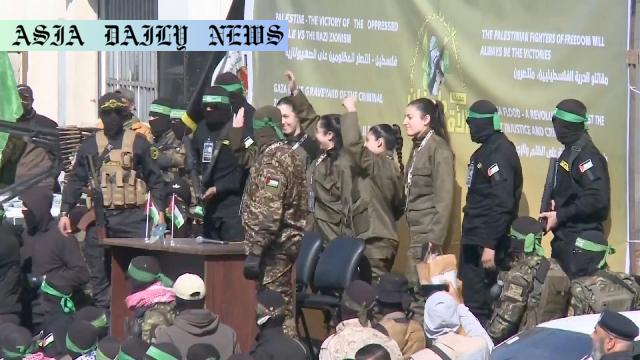Hostage Swap: Hamas releases four Israeli female soldiers in the second exchange of prisoners under ceasefire agreement.

Another Phase of Hostage Release Under Ceasefire
In a significant development under the current ceasefire agreement, Hamas has freed four female Israeli soldiers, marking the second phase of hostages being released to the Red Cross. The release is part of a truce brokered to span six weeks, during which 33 Israeli hostages will be released in phases. The four women have reunited with their families, bringing hope and relief after a prolonged period of captivity.
The Human Cost of This Truce
The operation comes amidst an agreement requiring mutual concessions. To reciprocate, Israel has freed 200 Palestinian prisoners. These developments indicate ongoing efforts to bring an end to hostilities and restore a semblance of normalcy in the region, at least temporarily. However, the slow progression of the hostage exchange reveals the deep-seated complexities of the situation.
Shortcomings and Challenges in the Agreement
Despite the positive aspects of the ceasefire, tensions remain. Israeli officials have accused Hamas of breaching the agreement by failing to release an agreed-upon civilian hostage. As a direct response to this alleged violation, Israel has announced a delay in allowing displaced Palestinians to return to northern Gaza as planned.
Hope Amidst Fragile Peace
Both sides have refrained from significant clashes since the ceasefire began, except for reported incidences of Israeli forces opening fire in central Gaza. The ceasefire provides a critical window of time for peace efforts to advance, though the path forward seems fraught with challenges. With 90 hostages, including women, children, and elderly individuals, still in captivity, the journey toward a comprehensive resolution is far from over.
The Path Ahead
The exchange agreement, while providing a moment of temporary relief for affected families, also highlights the broader conflict’s deep-seated issues. Ongoing negotiations and pressure are necessary to ensure the safe and timely return of all hostages, as well as to lay the groundwork for long-term peace. Both sides must adhere to the established terms if this ceasefire is to hold and result in concrete outcomes.
Global Reactions and Ethical Dilemmas
The world has had mixed reactions to the situation. While the release of hostages and prisoners is a positive step, the delayed or incomplete fulfillment of terms casts a shadow over the ceasefire. It also raises questions about the ethics of such exchanges given the underlying issues in the region’s prolonged and violent conflict. Both sides face significant criticism and scrutiny as international observers closely monitor the situation.
Commentary
The Struggle Between Progress and Setbacks
The release of hostages under the ceasefire agreement is undoubtedly a bittersweet moment. On one hand, it brings immense relief to the families of those freed, offering a glimpse of humanity amidst the cold, brutal realities of conflict. On the other, it painfully underscores the lives still held captive and the complex web of negotiations required to secure their freedom.
Political Ramifications of the Swap
Deals like these often come at significant political and ethical costs. For Israel, the release of hundreds of Palestinian prisoners for a small number of hostages raises questions about the effectiveness of the exchange and whether it inadvertently sets a precedent for future crises. For Hamas, the agreement reflects both a tactical decision and a gamble, seeking to bolster their position while under scrutiny for their continuing actions.
The Way Forward
Ultimately, moments like these shine a light on the necessity of diplomacy and humanity amidst conflict. While the temporary calm provided by the ceasefire is commendable, it is inadequate as a long-term solution unless followed by concrete actions toward peace. All parties must commit to adhering to existing agreements and work tirelessly to prevent further violence, ensuring that such crises do not repeat themselves.


